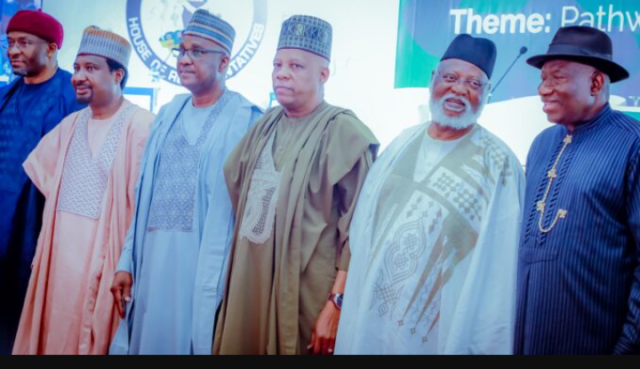Abbas has underscored that the evolving challenges have rendered the existing unitary policing system within the Nigeria Police Force ineffective, thus prompting the demand for the establishment of state police forces.

Rep. Tajudeen Abbas, the Speaker of the House of Representatives, has stated that the emerging challenges in the country have rendered the current unitary policing system under the Nigeria Police Force ineffective, leading to calls for its decentralization by way of having state police.
Speaker Abbas also noted that the numerous security challenges have overstretched the current security architecture in Nigeria but insists that the House remains neutral in the debates for and against the creation of state police.
The Speaker made this known in Abuja on Monday at the National Dialogue on State Policing, which the House organised on the proposal to decentralise the current NPF and empower states to create and operate their policing system police.
The proposal for state police is part of the ongoing review of the 1999 Constitution by the 10th National Assembly.
OrderPaper recalls that the Deputy Speaker, Rep. Benjamin Okezie Kalu, and 14 others had sponsored the bill seeking to alter the relevant sections of the 1999 Constitution to empower the states to establish their policing outfits.
OrderPaper also recalls that the House had on February 20, 2024, passed for second reading, the bill seeking to create police structures in each of the states of the federation.
Speaker Abbas stated: “Our mission here is simple: to deliberate the future of policing in Nigeria, reflecting on our historical context and aligning our actions with the demands of our diverse and dynamic populace and daunting contemporary security challenges that have stretched our existing system to a breaking point.
“The concept of state police involves decentralising law enforcement functions to the state level, thereby allowing for more localised and responsive policing tailored to the unique needs of each State.
“However, Section 214 of the 1999 Constitution establishes the Nigerian Police Force as unitary police ‘for the Federation or any part thereof.’ However, as noted earlier, evolving security challenges and other institutional and structural challenges have severely affected the general effectiveness of the police.”
He added: “As you are mostly aware, this deficit has resulted in the military engaging in policing functions in all States of the Federation, including the FCT. In turn, this has also overstretched the armed forces and affected their effectiveness in combatting other broader security challenges, including those that threaten the territorial integrity of Nigeria.”
However, the Speaker admitted that many have argued that a decentralised and community-based approach to policing has become imperative to empower the states to address the complex security challenges in the context of their local environment and peculiarities.
“Some see the current centralised structure of the police as a negation of ‘true federalism’. Several countries structured as Federations have well-established state, provincial, or regional police that exercise authority over relevant sub-national jurisdictions and collaborate on law enforcement matters with national or federal police, where both exist,” he added.
Speaker Abbas listed the issues he thought were critical to the overall conversation on the merits and demerits of state policing, and its desirability or otherwise for Nigeria.
He said: “First and foremost, it is imperative to acknowledge that the push for reforming our police forces is not merely desirable but necessary. We are at a stage where public trust in law enforcement is teetering.
“Also, the burden of policing the vast geographical expanse of our country and a rapidly expanding population warrants a reform of the current structure. The need for a system that maintains law and order and upholds every Nigerian’s dignity and rights cannot be overstated. Reform is essential to heal and to build – rebuilding trust, rebuilding effectiveness, and rebuilding our shared commitment to justice.”
Speaker Abbas also noted that, whereas most Nigerians agree on the need to reform policing, that is usually where the consensus ends, stating that “there is no agreement on how best to proceed with the reform or the best policing model for Nigeria.”
